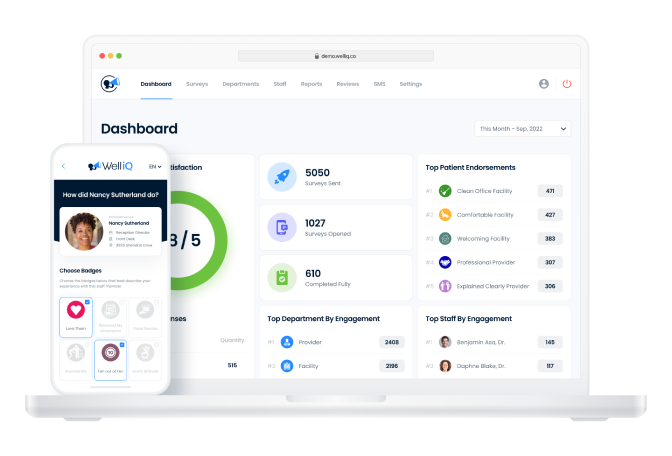Improve Healthcare Employee Engagement with Patient Feedback

There is no shortage of news coverage or data that shows the extraordinary stress Covid-19 has placed on healthcare workers for the last three years. Concerns for their patients, friends, families, and themselves have created a scenario in which they are pushed far past capacity. Yet most healthcare workers continue to push themselves past all expectations as they continue to support their communities and practices. These behaviors are not sustainable. Our healthcare workers need new tools and support to continue caring for their communities.
Table of Contents
The patient experience problem
Extreme understaffing, fatigue-based errors, and high attrition rates at all staffing levels, show a pattern of overwork and low morale. As a result, the healthcare turnover rate is second only to hospitality and can exceed 20%1. These trends are disturbing and need to be addressed at the facility and leadership levels. Organizations cannot maintain the current staffing churn. The financial and environmental impacts associated with high staff turnover have stretched budgets for recruiting, hiring, training, and retaining healthcare workers to the max. The result has been a noticeable ripple effect impacting staff engagement and patient experience throughout most healthcare organizations.
Healthcare workers are often not recognized for their hard work, sacrifice, and herculean effort to treat every patient with compassion under even the most difficult circumstances. Typical healthcare workers spend their day caring for patients, balancing hectic schedules, managing understaffing challenges, and maintaining their composure in the face of increasing patient and administrative demands. Unlike a corporate environment, there often aren’t objective measurements of performance that a healthcare worker can be clearly and accurately measured and rewarded for. When healthcare workers receive feedback, it is often because a problematic situation they have little control over has escalated to an administrator by a disgruntled patient or family member.
Objective feedback can improve employee behavior, morale, and retention. Feedback helps drive organizational change that positively supports the critical bond of dependency between staff and patients and improves the bottom line for healthcare organizations. Payroll is the number one expense for any organization. Thus, retaining and rewarding top talent is vital to the success of all organizations.
Consider that the average patient interacts with five to seven employees during a single office visit and up to 20 employees during a hospital visit. Each interaction represents an opportunity for the staff to positively impact the patient’s experience and for the organization to acknowledge and improve these encounters and outcomes.
Improving patient experience
To improve the patient experience, we must first measure the patient experience. Using an objective measurement tool such as Well iQ, helps reinforce accountability and behaviors within teams and throughout the entire organization- improving the quality of care. In addition, anticipating patient expectations allows organizations to map staff behavior to those expectations- driving engagement for both groups. What gets measured gets rewarded; what gets rewarded gets done.
Too often, organizations avoid seeking feedback out of fear that it will decrease staff morale and not lead to measurable and achievable changes in their organization; however, when patients are given an easy way to provide feedback, the feedback is overwhelmingly positive, and no less actionable than negative feedback.
Improving the patient experience leads to better patient outcomes, increasing positive staff engagement and driving actionable change throughout healthcare organizations. When applied correctly, feedback can lead to lasting changes, enabling organizations to move from reactive to proactive to preemptive in their efforts to improve what the patient expects and the employee provides.
The cyclical relationship between patients and healthcare workers can make or break a healthcare practice. Giving management teams tools to objectively measure the impact when the staff-to-patient ratio is negatively impacting patient care, and delivering transparency into what is happening at each stage of the patient journey, can help teams make decisions about how to best serve their patients and staff. In addition, prompt response to issues improves healthcare staff engagement and ensures they have the tools, time, and resources they need to support a thriving practice and a busy hospital.
Everyone is busy in healthcare; there isn’t time to slow down and manually evaluate staff workloads or individual interactions and how those workloads impact patient experiences and healthcare outcomes. A sophisticated tool that fills the gap and creates measurable, actionable, and impactful feedback for healthcare practices is necessary for today’s consumer and reviews-driven environment. Even better, you can utilize specific feedback to boost staff morale, drive retention, and recognize and reward the stewards of your brand.
[1] https://www.sj-r.com/story/news/healthcare/2022/03/14/turnover-health-care-workforce-and-its-effects-patients/7001765001/



